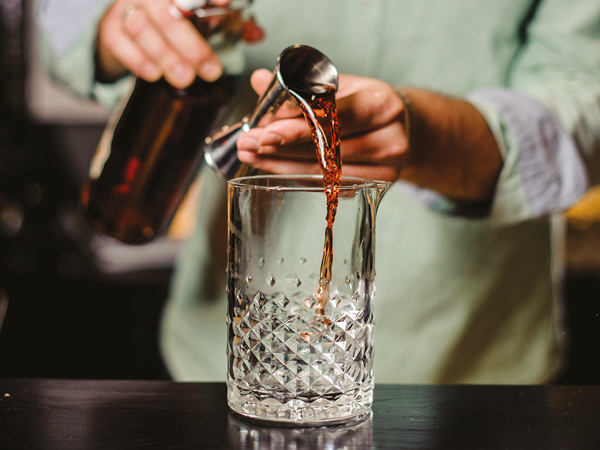
Headline Heroes: Vermouth holds it all together
David Kermode looks at the origins of vermouth and discovers a diverse cocktail ingredient as well as a strong standalone player.
From its origins as a medicinal tincture for bilious conditions to bartender favourite, vermouth has come a long way. Aromatic, beguilingly bittersweet and fascinating in its complexity, it is delicious on its own, poured over ice, but it is more widely celebrated for a form of liquid alchemy, bringing together the different components of a cocktail to ensure the completed serve is greater than the sum of its parts.
Vermouth is sufficiently diverse, as a category, that no two examples will ever taste the same, though core ingredient wormwood provides the foundation. Beyond that, it’s down to ancient recipes, herbal concoctions, botanical infusions and exotic spices to create a delicious point of difference, as Nicola Olianas, global brand ambassador at Fratelli Branca, explains: “A vermouth is essentially a fortified and aromatised wine … enriched with alcohol and sugar, and infused with natural flavourings extracted from botanicals, with a thoughtfully selected blend of herbs and spices, it offers a distinctive character and complexity that truly sets it apart. What I find particularly special about vermouth is that it has never lost its charm; it continues to thrive in bars and homes around the world, seamlessly fitting into both classic and modern cocktail culture.”
↓
New age of vermouth
Seasoned vermouth expert Kate Hawkings, author of Aperitif, has relished the rebirth of a heritage style: “My book was published in 2018 and since then there has been a huge number of new, artisanal examples on the market, particularly from the UK. I think this ‘new age’ can be traced back to the relaunch of Carpano’s Antica Formula, one of the original commercial vermouths from the 19th century.”
Though vermouth has been a back-bar staple for several centuries, its recent renaissance has undoubtedly been fuelled by cocktail culture. Spirits consultant Shannon Tebay, who oversees the judging of the category for the IWSC, has witnessed a desire from drinkers to experiment: “Vermouth is found in so many wonderful classic cocktails: Negroni, Martini, Manhattan, Vieux Carré, to name just a few. Once a cocktail template is understood, the playful practice of substitution can begin. What happens if you swap blanc vermouth for dry vermouth in your Martini? Or one sweet vermouth for another in your Negroni? This is a great way to discover personal preferences, build up your vermouth collection, and even create new bespoke cocktails at home.”
At Speciality Drinks, buying director Dawn Davies MW has observed a rise in sales of vermouth, including a spike during the pandemic: “Over the last five years we have definitely seen an upturn in the volumes of vermouth being sold, up by around 30%. Cocchi Vermouth di Torino is in my top sellers online every week. The drier styles of vermouth are less popular but they too have seen an increase. I think people have become more confident in understanding them and that is partly due to the cocktail culture that’s so strong now, but also to home-grown vermouth brands that are educating the consumer on how to drink them.”
So what makes the perfect vermouth? “It is that perfect balance between bitterness from the wormwood, and the other herbs and sweetness of fruit,” says Davies.
Q&A: Nicola Olianas global brand ambassador, Fratelli Branca Distillery
Tell us who first created your Antica vermouth?
Antica Formula has a long and fascinating history intertwined with the rich tapestry of Italy itself. The journey began in Turin in 1786, when Antonio Benedetto Carpano crafted the very first formula, ingeniously combining various herbs and spices with wine to create a unique elixir that would lay the groundwork for the vermouth category. Believing wholeheartedly in his creation, Carpano sent a case to King Vittorio Amedeo III, who appreciated this thoughtful gift and declared it a success. As time went on, the original recipe evolved, giving rise to iconic brands like Carpano and Punt e Mes. The real magic happened when Giuseppe Bernardino Carpano stumbled upon an original secret recipe tucked away in an old drawer belonging to his grandfather Antonio Benedetto. This hidden gem sparked the creation of Antica Formula, a vermouth crafted with an authentic touch that honours its heritage.
Tell us more about vermouth’s role in Italian drinking culture?
The origins of the Italian aperitif actually coincide with the birth of vermouth back in 1786 in Turin. This drink quickly became a staple of Italian culture, laying the foundation for a whole category of beverages enjoyed around the world. Over the years, the aperitif has evolved into an essential part of daily life, embodying a spirit of hospitality and togetherness. It invites people to gather, savour their drinks, and enjoy each other’s company, making vermouth an integral part of this beloved tradition. It’s a unique expression of Italian culture and lifestyle that invites you to slow down, connect and celebrate the moment.
What makes your Antica Formula different and special?
Antica Formula is truly unique due to its heritage and artisanal production process, which has remained consistent since its origins in 1786. What sets it apart is the incredible depth and complexity that comes from blending the finest botanicals in a way that stays true to tradition, while still feeling modern and refined. Its unmistakable vanilla notes and rich, layered profile make it a standout choice for bartenders who want to elevate their creations. Rather than simply being a vermouth, Antica Formula brings an unmistakable Italian touch to every cocktail. It’s versatile, timeless and adds a level of sophistication that’s hard to match.






